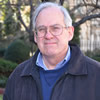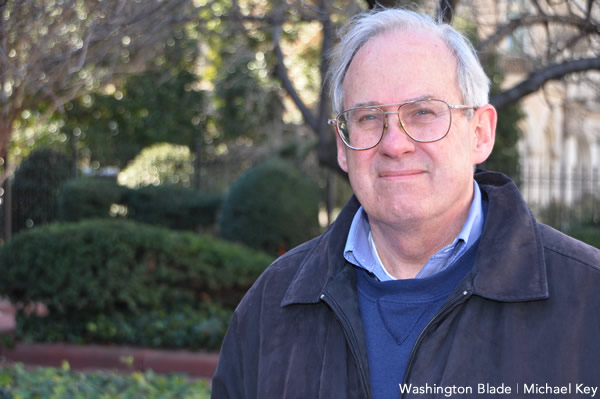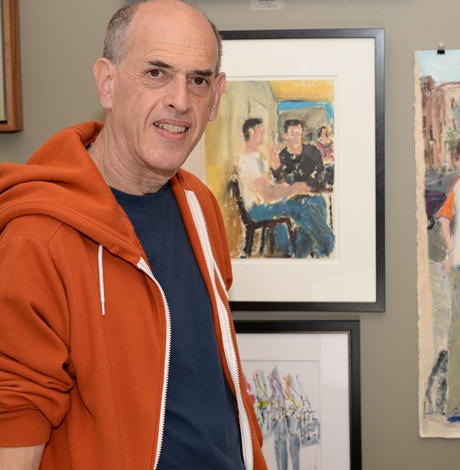Arts & Entertainment
Queery: Michael Rawson
The local painter answers 20 gay questions

 Longtime Dupont Circle resident Michael Rawson has always been interested in painting, but his retirement a few years ago has given him more time to get serious about it. And the dedication is paying off — the 64-year-old Quakertown, Pa., native has seven of his oil paintings in the new exhibit “Beyond Words: The Symbolic Language of Plants” which opens this weekend at the Delaware Art Museum in Wilmington and runs through April 8.
Longtime Dupont Circle resident Michael Rawson has always been interested in painting, but his retirement a few years ago has given him more time to get serious about it. And the dedication is paying off — the 64-year-old Quakertown, Pa., native has seven of his oil paintings in the new exhibit “Beyond Words: The Symbolic Language of Plants” which opens this weekend at the Delaware Art Museum in Wilmington and runs through April 8.
Rawson is a member of Studio 155, an artists group that formed after its 17 members took classes together at the Corcoran Gallery of Art and collaborated on the 2006 exhibition “Botanical Treasures of Lewis and Clark.” Together their work is featured in the large Delaware exhibit. They work “to realistically capture the natural world while expanding the boundaries of botanical art.”
“I always loved plants,” Rawson says. “My mother is a good gardener. … And trees are our tallest and biggest plants. They are what give us life — the air we breathe, the food we eat, the shelter, our clothes. So that was my inspiration.”
Rawson spent most of his career as a pre-school teacher and says he “always worked well with young children.”
He came to Washington in 1966 to attend George Washington University. He and partner Gordon Binder, a senior fellow at the World Wildlife Fund, have been together 38 years. They attribute the longevity of their pairing to “companionship, intimacy, friendship, common interests and enough differences to keep it lively.”
Rawson enjoys water aerobics, reading, watching TV, quiet evenings at home and, of course, painting, in his free time. Go to delart.org for more information on the exhibition. The museum is at 2301 Kentmere Parkway in Wilmington.
How long have you been out and who was the hardest person to tell?
In my head, since sixth grade. But in fact not until I met Gordon, and then we fell in love. My father. I learned how upset he was when he recognized that I was gay (I had left home by then). Years later, at Christmas, when Gordon gave me our paid mortgage in a box, my father said, “He’s a smart man,” and I knew he had embraced us both.
Who’s your LGBT hero?
Michelangelo. He made art that today we still stand in awe of.
What’s Washington’s best nightspot, past or present?
For my generation, few places could beat the exhilaration of entering the Lost and Found on a lively night.
Describe your dream wedding.
I had it, with my family and friends in July 2010 thanks to David Catania and the D.C. City Council. It surprised me how moving and affirming it was, and this after 38 years together.
What non-LGBT issue are you most passionate about?
Early childhood education, to give each child a chance to reach his or her potential.
What historical outcome would you change?
The assassination of Abraham Lincoln, in hope that, with malice toward none and charity toward all, our country’s racial history might have played out better.
What’s been the most memorable pop culture moment of your lifetime?
New York City. The Saint. 1983. 4 a.m. Betty Buckley singing “Memories” from “Cats.” The room is pulsating.
On what do you insist?
I’m a middle child and thus I can bend lots of ways.
What was your last Facebook post or Tweet?
Sorry, not quite there yet.
If your life were a book, what would the title be?
“Hard to Say No: The Life of Michael Rawson”
If science discovered a way to change sexual orientation, what would you do?
Nothing, though Gordon insists we would start a campaign to get Chord Overstreet to join our team.
What do you believe in beyond the physical world?
A life force that we share with all living things
What’s your advice for LGBT movement leaders?
Encourage our youth. From their ranks will come our future leaders and they may just be the generation that finally brings it home for us.
What would you walk across hot coals for?
If there’s good barbecue along the way.
What LGBT stereotype annoys you most?
Gay men are driven solely by sex, not that there’s anything wrong with that.
What’s your favorite LGBT movie?
“Maurice,” the Merchant-Ivory production.
What’s the most overrated social custom?
Celebrities Tweeting about every ordinary thing they do.
What trophy or prize do you most covet?
A place or two on the wall of the National Gallery of Art for my paintings.
What do you wish you’d known at 18?
It gets better, much better.
Why Washington?
I came to school in Washington, GW, in 1966. A few years later, I met Gordon when we were interns at the Council on Environmental Quality and a little over a year later we hooked up and we made our life together. We’ve lived in Dupont Circle, one of the great urban neighborhoods anywhere. We value the cultural scene, the lively street life, so many places to go and things to do, and of course the friends we have here.
Music & Concerts
Indigo Girls coming to Capital One Hall
Stars take center stage alongside Fairfax Symphony

Capital One Center will host “The Indigo Girls with the Fairfax Symphony Orchestra” on Thursday, June 19 and Friday, June 20 at 8 p.m. at Capital One Hall.
The Grammy Award-winning folk and pop stars will take center stage alongside the Fairfax Symphony, conducted by Jason Seber. The concerts feature orchestrations of iconic hits such as “Power of Two,” “Get Out The Map,” “Least Complicated,” “Ghost,” “Kid Fears,” “Galileo,” “Closer to Fine,” and many more.
Tickets are available on Ticketmaster or in person at Capital One Hall the nights of the concerts.

Friday, June 13
“Center Aging Friday Tea Time” will be at 2 p.m. in person at the DC Center for the LGBT Community’s new location at 1827 Wiltberger St., N.W. This is a social hour for older LGBTQ adults. Guests are encouraged to bring a beverage of choice. For more details, email [email protected].
Women in Their Twenties and Thirties will be at 8 p.m. at Wundergarten. An update will be posted the night of the event on where to find WiTT’s table. There’ll be a Pride flag to help people find the group. For more details, join WiTT’s closed Facebook group.
Go Gay DC will host “LGBTQ+ Community Pride Month Happy Hour” at 7 p.m. at Freddie’s Beach bar and Restaurant. This event is ideal for making new friends, professional networking, idea-sharing, and community building. This event is free and more details are available on Eventbrite.
Saturday, June 14
Go Gay DC will host “LGBTQ+ Community Pride Month Brunch” at 11 a.m. at Freddie’s Beach Bar & Restaurant. This fun weekly event brings the DMV area LGBTQ+ community, including Allies, together for delicious food and conversation. Attendance is free and more details are available on Eventbrite.
Rainbow History Project will host “Behind the Scenes With the Senior Curator of ‘Pickets, Protests and Parades’” at 7:30p.m. at Freedom Plaza. This behind-the-scenes experience offers a rare glimpse into the creative process behind this groundbreaking showcase of DC’s LGBTQ+ history. Learn about the bold design decisions that shaped the Quote Wall and Hero Cubes and the powerful stories that almost made the cut. Tickets cost $82 and can be purchased on Eventbrite.
Monday, June 16
“Center Aging Monday Coffee Klatch” will be at 10 a.m. on Zoom. This is a social hour for older LGBTQ+ adults. Guests are encouraged to bring a beverage of choice. For more details, email [email protected].
Genderqueer DC will be at 7 p.m. in person at the DC Center for the LGBT Community. This is a support group for people who identify outside of the gender binary. Whether you’re bigender, agender, genderfluid, or just know that you’re not 100% cis. For more information, visit their website at www.genderqueerdc.org or check us out on Facebook.
Tuesday, June 17
Bi+ Roundtable and Discussion will be at 7 p.m. on Zoom. This is an opportunity for people to gather in order to discuss issues related to bisexuality or as Bi individuals in a private setting. Check out Facebook or Meetup for more information.
Wednesday, June 18
Job Club will be at 6 p.m. on Zoom. This is a weekly job support program to help job entrants and seekers, including the long-term unemployed, improve self-confidence, motivation, resilience and productivity for effective job searches and networking — allowing participants to move away from being merely “applicants” toward being “candidates.” For more information, email [email protected] or visit thedccenter.org/careers.
“Legends Live Loud: A Queer Karaoke Experience” will be at 7 p.m. at the DC Center for the LGBT Community. This will be a dynamic, Center-wide karaoke event celebrating the brilliance and cultural impact of some of our most colorful queer icons. The Center will honor legends through music, pop culture, dance, and inextinguishable liberation. For more details and to sign up, visit the DC Center’s website.
Thursday, June 19
Go Gay DC will host “LGBTQ+ Book Club” at 7:30 p.m. at Federico Ristorante Italiano. This book club is co-hosted by EQUALITY NoVa and is another opportunity to engage in a fun and rewarding activity. The group doesn’t discriminate when it comes to genres it reads – from classic literature to best selling novels to biographies to histories to gay fiction. For more details, visit Eventbrite.
Cultivating Change Foundation will host “Cultivating Pride Happy Hour” at 5:30 p.m. at Dacha Beer Garden. This Pride month, the organization is inviting LGBTQ+ people and allies in food and agriculture to come together in communities nationwide. These informal gatherings are a chance to connect, celebrate, and build community, whether it’s over coffee, a cocktail, or a conversation. Attendance is free and more details are available on Eventbrite.

There was a time, early in his career, that young filmmaker Wes Anderson’s work was labeled “quirky.”
To describe his blend of dry humor, deadpan whimsy, and unresolved yearning, along with his flights of theatrical fancy and obsessive attention to detail, it seemed apt at the time. His first films were part of a wave when “quirky” was almost a genre unto itself, constituting a handy-but-undefinable marketing label that inevitably became a dismissive synonym for “played out.”
That, of course, is why every new Wes Anderson film can be expected to elicit criticism simply for being a Wes Anderson film, and the latest entry to his cinematic canon is, predictably, no exception.
“The Phoenician Scheme” – released nationwide on June 6 – is perhaps Anderson’s most “Anderson-y” movie yet. Set in the exact middle of the 20th Century, it’s the tall-tale-ish saga of Anatole “Zsa-Zsa” Korda (Benicio del Toro), a casually amoral arms dealer and business tycoon with a history of surviving assassination attempts. The latest – a bomb-facilitated plane crash – has forced him to recognize that his luck will eventually run out, and he decides to protect his financial empire by turning it over (on a trial basis, at least) to his estranged daughter Liesl (Mia Threapleton), currently a novice nun on the verge of taking her vows. She conditionally agrees, despite the rumors that he murdered her mother, and is drawn into an elaborate geopolitical con game in which he tries to manipulate a loose cadre of “world-building” financiers (Tom Hanks, Bryan Cranston, Riz Ahmed, Mathieu Amalric, and Jeffrey Wright) into funding a massive infrastructure project – already under construction – across the former Phoenician empire.
Joined by his new administrative assistant and tutor, Bjorn (Michael Cera), Korda and Liesl travel the world to meet with his would-be investors, dodging assassination attempts along the way. His plot is disrupted, however, by the clandestine interference of a secret coalition of nations led by an American agent code-named “Excalibur” (Rupert Friend), who seeks to prevent the shift of geopolitical power his project would create. Eventually, he’s forced to target a final “mark” – his ruthless half-brother Nubar (Benedict Cumberbatch), with whom he has played a lifelong game of “who can lick who” – for the money he needs to pull it off, or he’ll lose his fortune, his oligarchic empire, and his slowly improving relationship with his daughter, all at once.
It’s clear from that synopsis that Anderson’s scope has widened far beyond the intimate stories of his earliest works – “Bottle Rocket,” “Rushmore,” “The Royal Tenenbaums,” and others, which mostly dealt with relationships and dynamics among family (or chosen family) – to encompass significantly larger themes. So, too, has his own singular flavor of filmmaking become more fully realized; his exploration of theatrical techniques within a cinematic setting has grown from the inclusion of a few comical set-pieces to a full-blown translation of the real world into a kind of living, efficiently-modular Bauhaus diorama, where the artifice is emphasized rather than suggested, and realism can only be found through the director’s unconventionally-adjusted focus.
His work is no longer “quirky” – instead, it has grown with him to become something more pithy, an extension of the surreal and absurdist art movements that exploded in the tense days before World War II (an era which bears a far-too-uncomfortable resemblance to our own) and expresses the kind of politically-aware philosophical ideas that helped to build the world which has come since. It is no longer possible to enjoy a Wes Anderson movie on the basis of its surface value alone; it is necessary to read deeper into his now-well-honed cinematic language, which is informed not just by his signature aesthetic but by intellectual curiosity, and by the art, history, and cultural knowledge with which he saturates his work – like pieces of a scattered puzzle, waiting to be picked up and assembled along the way. Like all auteurs, he makes films that are shaped by a personal vision and follow a personal logic; and while he may strive to make them entertaining, he is perhaps more interested in providing insight into the wildly contradictory, often nonsensical, frequently horrifying, and almost always deplorable behavior of human beings. Indeed, the prologue scene in his latest endeavor illustrates each of those things, shockingly and definitively, before the opening credits even begin.
By typical standards, the performances in “Phoenician Scheme” – like those in most of Anderson’s films – feel stylized, distant, even emotionally cold. But within his meticulously stoic milieu, they are infused with a subtle depth that comes as much from the carefully maintained blankness of their delivery as it does from the lines themselves. Both del Toro and Threapleton manage to forge a deeply affecting bond while maintaining the detachment that is part of the director’s established style, and Cera – whose character reveals himself to be more than he appears as part of the story’s progression – begs the question of why he hasn’t become a “Wes Anderson regular” long before this. As always, part of the fun comes from the appearances of so many familiar faces, actors who have become part of an ever-expanding collection of regular players – including most-frequent collaborator Bill Murray, who joins fellow Anderson troupers Willem Dafoe and F. Murray Abraham as part of the “Biblical Troupe” that enact the frequent “near-death” episodes experienced by del Toro’s Korda throughout, and Scarlett Johansson, who shows up as a second cousin that Korda courts for a marriage of financial convenience – and the obvious commitment they bring to the project beside the rest of the cast.
But no Anderson film is really about the acting, though it’s an integral part of what makes them work – as this one does, magnificently, from the intricately choreographed opening credit sequence to the explosive climax atop an elaborate mechanical model of Korda’s dream project. In the end, it’s Anderson himself who is the star, orchestrating his thoroughly-catalogued vision like a clockwork puzzle until it pays off on a note of surprisingly un-bittersweet hope which reminds us that the importance of family and personal bonds is, in fact, still at the core of his ethos.
That said, and a mostly favorable critical response aside, there are numerous critics and self-identified fans who have been less than charmed by Anderson’s latest opus, finding it a redundant exercise in a style that has grown stale and offers little substance in exchange. Frankly, it’s impossible not to wonder if they have seen the same movie we have.
“The Phoenician Scheme,” like all of its creator’s work, is ultimately an esoteric experience, a film steeped in language and concepts that may only be accessible to those familiar with them – which, far from being a means of shutting out the “unenlightened,” aims instead to entice and encourage them to think, to explore, and, perhaps, to expand their perspective. It might be frustrating, but the payoff is worth it.
In this case, the shrewd political and economical realities he illuminates behind the romanticized “Hollywood” intrigue and his deceptively eccentric presentation speak so profoundly to the current state of world we live in that, despite its lack of directly queer subject matter, we’re giving it our deepest recommendation.
-

 World Pride 20252 days ago
World Pride 20252 days agoWorldPride recap: Festival, parade, fireworks, and Doechii
-

 U.S. Federal Courts2 days ago
U.S. Federal Courts2 days agoJudge temporarily blocks executive orders targeting LGBTQ, HIV groups
-

 Photos2 days ago
Photos2 days agoPHOTOS: WorldPride Parade
-

 Photos2 days ago
Photos2 days agoPHOTOS: WorldPride Street Festival and Closing Concert










